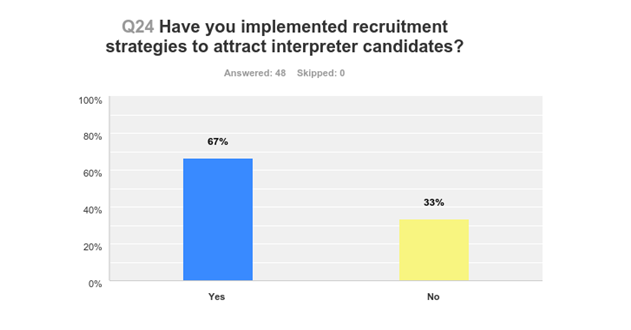Develop procedures to enhance the availability of qualified interpreters and bilingual specialists through recruitment, training, credentialing, and utilization efforts.
Qualified interpreters and language professionals are an essential part of a successful language access program. Therefore, the development and efficient use of language professionals is a key priority to most jurisdictions. At the Summit and in Action Step 5, jurisdictions explored strategies to develop procedures to enhance the availability of qualified interpreters and bilingual specialists through recruitment, training, credentialing, and efficient utilization efforts.
Strategies to Recruit Interpreters
In order to meet the demands of growing and fluctuating LEP populations, jurisdictions must proactively engage in the recruitment of interpreters. The majority of jurisdictions (32 out of 48) report that they have implemented recruitment strategies for interpreter candidates.
Jurisdictions have employed a diversity of creative efforts, activities and programs to recruit qualified candidates, including outreach to colleges and community groups, an array of marketing materials targeted at different groups, online outreach (Twitter and Facebook), summits and seminars, scholarships, etc.
Below are details of jurisdictions’ efforts that they provided in the survey.
Outreach to Colleges, Community Groups, and Agencies
- We have successfully recruited candidates by doing outreach to community groups, professional interpreter organizations, local and statewide colleges and educational groups.
- We have spoken to civic groups as well as foreign language college students regarding the profession and certification.
- Press releases and classes at community colleges.
- Outreach to local community college and University modern languages programs. Interpreter job shadowing opportunities for both high school students and adults. Participation by certified interpreters in bilingual career fairs.
- Contacted various colleges and communities in the area to identify potential candidates.
- Presentations at colleges and universities. Community presentations describing the interpreter-profession. Fostering and building loyal interpreter team that spreads positive work about the program. Continuing Education offered nation-wide to candidates and interpreters.
- Campus recruiting (working with colleges & universities; law school); Work with ethnic community organization; Internal referral program; Strategic ad posting through Facebook, utilizing/working with the agency's recruiter, etc.
- We present at high schools and colleges to discuss careers for those who study languages; we created a recruitment brochure; we work with the state Office of Refugee Services Program to train interpreter candidates who speak "refugee" languages - they provide funding to offset the fees of those interested in court interpreting.
Seminars, Summits, and Information Tables
- Tennessee has created an interpreter Summit. See SPOTLIGHT ON TENNESSEE.
- I have hosted training seminars in the northern, central and southern regions of our state. I havecollaborated with colleges to provide trainings on their campuses. I have utilized the television and other media regarding our program. I have reached out to community agencies that provide services to LEP communities.
- This week our staff are tabling at NAJIT and CLAC, and presenting several workshops at the latter.
Marketing Materials – Brochures, Press Releases
- "Be a court interpreter" campaign with colorful posters and brochures featuring real interpreters. Wide distribution of these materials over several years, to schools, government agencies and community organizations.
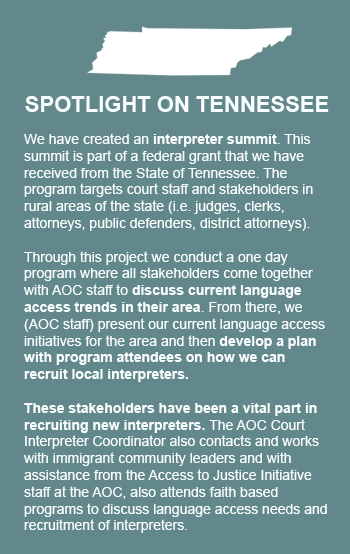 Recruitment brochures and related materials shared with courts (to be distributed at job fairs, Law Day, high schools); Court Interpreters Program staff attendance at interpreter conferences, ethnic community festival and fairs.
Recruitment brochures and related materials shared with courts (to be distributed at job fairs, Law Day, high schools); Court Interpreters Program staff attendance at interpreter conferences, ethnic community festival and fairs. - We have created flyers and materials targeted to two different audiences: bilingual individuals with no interpreting experience, and professional interpreters that have little or no experience with court interpreting. We have established communication feedback loops with local interpreter organizations and agencies to distribute information about upcoming certification events and trainings. The Language Access Committee is now starting to come up with a plan for expanded recruitment to community organizations, colleges and universities, etc.
- Radio announcements, website announcements, press release to all media stakeholders, advertisement in newspaper
- Distribution of recruitment flyer to courts, local colleges and universities, other state agencies.
- A brochure called "Do you Speak Another Language Fluently?" is used at recruiting events and is placed in racks in courthouses statewide.
Web-based Outreach
- Web site announcements.
- The recruitment page with revised registration form provides information to all candidates, recruitment announcements through the Branch's Twitter feed.
- Posting of recruitment flyers on community Facebook pages.
Other
- Provide scholarships to languages of lesser diffusion for preparation for oral exam rating.
- The Alaska Court System works with the Language Interpreter Center to recruit potential legal interpreters. The Language Interpreter Center recruits potential interpreters through a myriad of ways. Additionally, the court system works with other state courts to contract with qualified and certified interpreters.
- Through the work of OEAC, the Hawaii State Judiciary has been awarded various grants that have allowed the Judiciary to offer free skills building and accent reduction training to its court interpreters, which, in turn, makes freelance interpreters more marketable in the private sector. The Judiciary also publishes a list of its credentialed court interpreters on the Judiciary's website, which has served as a free marketing resource and valuable incentive for freelance court interpreters.
- Information regarding the court interpreting profession, and the process to become a registered and officially designated court interpreter has been disseminated statewide to all circuits in the form of a brochure to assist with local recruitment efforts. Additional recruitment suggestions are made available to the trial courts via the language access plan.
- We have started a program to identify and recruit potential interpreters in LOTS.
- Work with other state agencies that use non-court certified interpreters in certain languages to identify individuals to provide outreach to regarding becoming court-certified.
- Individual judicial districts have implemented various successful recruitment strategies.
- We hope to implement recruitment of candidates in the future.
Trainings for Interpreters
In addition to recruiting qualified interpreters, training existing interpreters, language staff, and potential interpreters is of great importance. Seventy-five percent of jurisdictions report that they conduct trainings for interpreters working in the profession. (Fig. Q22.) They hold comprehensive trainings that may include language access policies, ethics, and/or continuing education. These efforts serve to improve the knowledge and skills of language professionals on an ongoing basis, and thus improve the program’s language services.
Seventy-three percent of jurisdictions reported in the survey that they conduct trainings for interpreter candidates. (Fig. Q23.) These states train interpreter candidates prior to certification or credentialing in an effort to increase the overall pool of qualified language professionals.
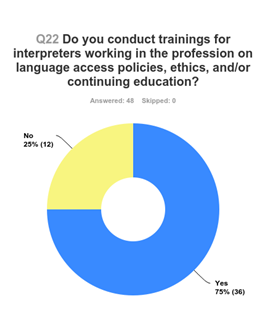
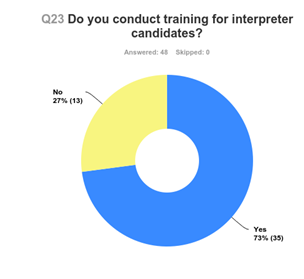
Credentialing and Qualifying Interpreters
In order to ensure the use of interpreters and language professionals with the level of knowledge, skill, and ability necessary to interpret court interactions, it is recommended that courts adopt standardized assessment procedures for the credentialing of state court interpreters.
In the survey, 85% of jurisdictions responded that they credential interpreters. (Fig. Q19.) Sixty-seven percent reported that they categorize interpreters based on test scores into different levels of qualification. (Fig. Q20.)
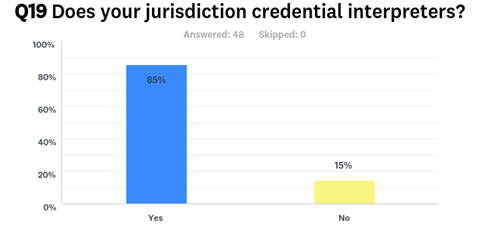

Jurisdictions typically select various levels of credentialing based on interpreter competency. The most commonly used levels are Certified, Registered, and Master. Out of the 32 jurisdictions that qualify their interpreters, 29 use Certified, 23 use Registered, and 9 use Master.
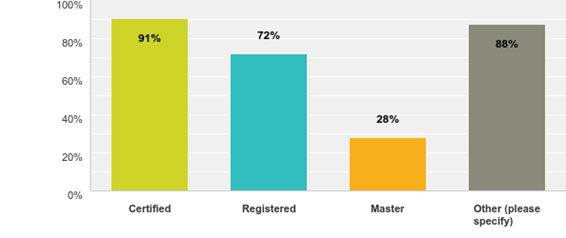
However, jurisdictions reported also using a variety of other levels of qualification. All of the levels noted, along with the most common ones from the multiple choice selections, are listed below in the table.
|
|
Jurisdictions provided more detail and definitions of their respective qualifications:
- Hawaii State Judiciary classified interpreters into 6 tiers of designation status, based on completion of training and objective test scores. Interpreters are classified as; Tier 1 (Registered); Tier 2 (Conditionally Approved); Tier 3 (Approved); Tier 4 (Certified) and Tier 6 (Certified Master). See Appendix A, Hawaii Rules for Certification of Spoken Language and Sign Language Interpreters, at http://www.courts.state.hi.us/docs/court_rules/rules/cssli.pdf
- We have a "qualified" tier for interpreters that speak languages that are not tested by the NCSC, but they have scored the highest score on an oral proficiency interview. We also have "Advanced" and "Master" tiers for ASL interpreters, since these were the preexisting designations under the entity that manages their licensure, the Illinois Deaf and Hard of Hearing Commission.
- Certified, but also holding federal certification (Spanish), SC:L (ASL), or having been designated as Professionally.
- The Alaska Court System categorizes interpreters as either certified or qualified. A certified interpreter has successfully passed an NCSC oral exam and court system requirements. A qualified interpreter has successfully completed court system requirements and has pass an oral proficiency exam to ensure the interpreter can interpret at a basic level necessary for proceedings.
- Qualified by the Administrative Office of the United States Courts (LOTS).
- The three official state-level designations are: certified, language skilled, and provisionally approved. Effective October 1, 2015, all interpreters must be registered prior to working in any court or court-related proceedings.
- Class A - Certified; Class B - took certification exam and came within 5% points of passing; Class C - completed orientation program, passed NCSC's written exam, and scored at least 11 on a 12 point scale on the ALTA oral proficiency exam.
- Master – Permits the interpreter to interpret court proceedings in all courts in this state, including justice courts and municipal courts. Basic – Permits the interpreter to interpret court proceedings in justice courts and municipal courts that are not municipal courts of record, other than a proceeding before the court in which the judge is acting as a magistrate.
- Non-credentialed – this category is an internal use only category for those that may have started the credentialing process but have not obtained credentials. We keep a list of non-credentialed to have as needed, as most of them have at least taken the 2 day workshop and know the ethics of interpreting. We do not provide these names on the AOC website as available interpreters but we may provide their contact information if we do not have credentialed interpreters for the language needed.
- Qualified, Provisionally Certified (rare). All practicing interpreters are required to register with the SCAO.
- AOC approved (master and journey) & AOC conditionally approved interpreters. In languages with no oral exam, interpreters begin at the AOC conditionally approved level after taking available exams.
- “Other" are identified as candidates, those who score at least 65% on the oral examination for certification on each of the 3 modes.
- Conditionally Approved designation category has just been approved along with the requirements. Expires in two years if they have not passed.








